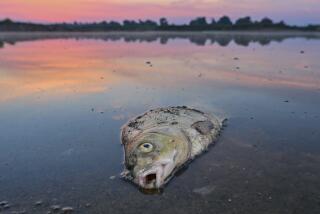Intersex fish found in Pennsylvania rivers spur search for chemicals

- Share via
Pennsylvania’s Department of Environmental Protection has begun an extensive sampling of chemical contaminants in response to the discovery of intersex fish in three of the state’s rivers, a department spokeswoman said.
Male fish carrying eggs were found in the Susquehanna, Delaware and Ohio river basins, a sign that the water may be tainted with chemicals, the U.S. Geological Survey found in research released Monday.
Amanda Witman, a DEP spokeswoman, said the agency is testing two tributaries of the Susquehanna River: Juniata River and Swatara Creek.
The USGS research said that two fish species, smallmouth bass and white sucker, were exhibiting intersex characteristics due to exposure to endocrine-disrupting chemicals — hormones and hormone-mimicking chemicals that caused the male fish to produce eggs.
“The sources of estrogenic chemicals are most likely complex mixtures from both agricultural sources, such as animal wastes, pesticides and herbicides, and human sources from wastewater treatment plant effluent and other sewage discharges,” said Vicki Blazer, a fish biologist and lead author of the USGS study.
Estrogenic chemicals disrupt the endocrine system, which regulates the release of hormones such as estrogen and testosterone. This interferes with the fish’s ability to reproduce.
Some of the compounds and contaminants found were new, and researchers had to develop new laboratory test procedures to measure them, Witman said.
“The results will provide a much better understanding of the kinds, distribution and concentrations of these compounds,” she said.
This isn’t the first time intersex fish have been discovered in U.S. rivers. Since 2006, the USGS has found similar characteristics during several surveys of bass in the Potomac River.
In the Pennsylvania survey, Blazer and colleagues collected fish from 16 sites in the Susquehanna, Delaware and Ohio river basins. Intersex males were found at every site where smallmouth bass were collected and their condition was generally worse in places just downstream from wastewater treatment plants, the researchers found.
Bass seem especially prone to becoming intersex when exposed to estrogenic compounds, the study found. The researchers also sampled white suckers and redhorse suckers. Redhorse suckers didn’t have any intersex characteristics, but the team found an egg cell precursor, or stem cells that could potentially develop into eggs, in the blood of some white suckers.
The most common hormone found in water and soil samples was estrone, a potent endocrine-disrupting chemical often found in sewage from wastewater plants and the manure of animals such as cows, chickens and pigs, the researchers said.
“We weren’t expecting the issue to be as widespread as it was,” Blazer said. “The number of fish affected and the severity was surprising.”
Blazer said any of these chemicals could affect humans, especially chemicals that entered the water from pharmaceuticals and personal care products, such as fragrances. The fish showed the effects of the pollutants, she said, because spending all their time in the water means they are continuously saturated in the substances.
Upgrading wastewater plant technology and fencing rivers so animals can’t excrete directly into the water would help, she said.
Rep. James P. Moran, a Democrat whose district is northern Virginia, issued a statement, calling the findings “troubling” and “yet another example of the adverse effects on water pollution in this country and another reminder that lawmakers need to take chemical waste regulation more seriously.”
Pennsylvania’s environmental agency began a multiyear analysis of the Susquehanna River in 2012, though samples collected by researchers are still being evaluated. Samples will continue to be collected through this summer and those results will be available next year, Witman said.
“DEP’s plan is to continue the sampling until it has an understanding of how these compounds may or may not impact the aquatic life in all streams and rivers, not just the Susquehanna,” she said.
More to Read
Sign up for Essential California
The most important California stories and recommendations in your inbox every morning.
You may occasionally receive promotional content from the Los Angeles Times.










